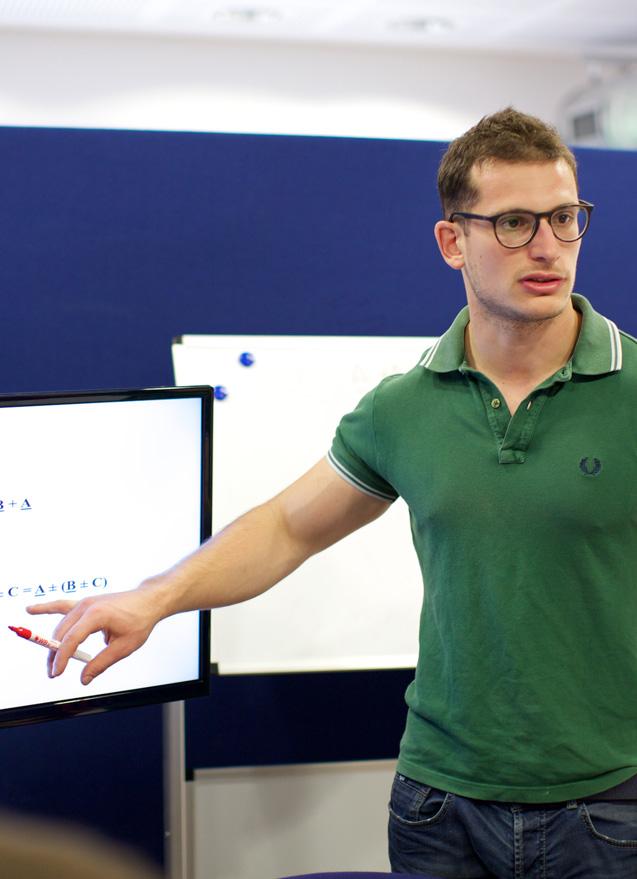One of the first things that a Mathematics undergraduate will tell a prospective student is that maths at university is entirely different to what you studied at school.
Below we’ve outlined some of the key features of a maths degree and tips on preparing.
Typically students studying maths in high school are taught the method for a particular question which they then apply to practice questions until they get it right most, if not all, the time.
They repeat this as they cycle through different modules within the field of mathematics, gradually increasing the bank of methods that they can apply to a fixed question to answer every question type that might appear on their exam paper.
Your teacher will grade your paper with a tick or a cross with additional marks to show your work. It’s all very methodical, predictable, and accompaniment to the old adage that ‘practice makes perfect.’
Course Modules Vary From Uni to Uni
Maths at the university level is not like this. Even the content of the modules is different; what you consider to be ‘pure’ maths, for example, prime numbers, may be included in an entirely separate module (prime numbers are commonly used in cryptography, so may be included in a related module).
To complicate things even further, each university has its system of compulsory and optional modules and different class sizes and styles.
However, lectures and seminars (sometimes known as tutorials) are usually present in all university courses.
Lectures are generally not interactive and are the elements of a course that students are likely to skip (which is a big mistake).
A lecture theatre may have up to 300 students all listening to a lecturer who will explain some theory and usually a couple of worked examples as part of a presentation. Students are expected to take notes.
At this point, many students put their notes in a “safe place” and panic that they can’t find them the day before exams.
Avoid this stress!
Take detailed notes during the lecture (it helps you pay attention if you’re struggling to stay focused) and as soon as possible afterward, sit down and work through your own practice questions.
What Can You Expect?
Independence of learning is the major difference between secondary and tertiary education and usually disarms first years.
It’s also a significant irritation for university lecturers who find themselves repeating their lectures to young students who are used to being spoon-fed.
It’s not the best way to make a good impression on someone who may be writing a reference for you at some point in the future.
Practicing Is Paramount For Success
Practicing now will also reduce the amount of work you have to do during exam season and make any follow-up tutorials much easier.
You are responsible for ensuring you’ve understood the theory and how it works in practice.
Your tutor will only help you if you have been working on understanding something for a while but have not quite made it. In this case, there is no shame in asking for help.
Seminars are much more of a collaborative process, and while this naturally makes them more engaging, it also means that you have to contribute, so come prepared.
Typically students will be using the theory they have learned in lectures to create proof that the maths does, in fact, work. This is the crucial difference for maths students stepping up to university-level maths.
Mathematical Notation
Rather than accepting that the method and theory are correct, undergraduates must explore the theory’s details and provide evidence that this is sound mathematics by using other mathematical principles.
At this point, you will also be taught what may seem like a new language: notation. You will likely have encountered notation, so it shouldn’t be too alien.
However, at the university level, your notation (symbols and lettering representing your mathematical work) is more likely to come under criticism than your actual mathematical thinking.
This is where the earlier point about practicing the maths taught in lectures comes in.
Engage in seminars
By following, revising, and then applying the mathematics and notation covered in the lecture, you will be able to follow the seminar much more efficiently. Your notation will naturally improve quickly, keeping you on the good side of your lecturers.
Seminars are a time to get stuck in, make mistakes, and then be guided to a solution by your peers or your lecturer.
Engaging in these sessions is important, so try to push beyond the awkward silence that might punctuate the first couple of weeks.
So, now that you understand what to expect, how can you best prepare? It’s impossible to provide one hard and fast rule that will work for all students.
One of the first things you learn at university is that every person is unique and learns in their way.
Top Universities Conduct Maths Admission Exams
Having said that, maths admissions exams provide great insight into university-level maths while also helping you study for your high school exams!
Most of the best math universities in the UK have a maths admissions exam that applicants must take before applying to the university. There are STEPs, MATs, TMUAs, and AEAs.
These are largely the same: they call on your ability to apply maths and logic to a series of questions.
However, they are also a good bridge between secondary- and tertiary-level mathematics; you’ll find they are harder than most of your high school studies.
There are plenty of free online resources for each exam, so download them and start practicing. Anyone applying to a top university must prepare for at least one of these exams, but the sooner you start practicing, the better.
Are You Passionate About Maths?
If you hate every second of the preparation for these exams, you certainly are not alone, but it may also indicate that maths at university is not for you. It’s much better to figure this out before you apply!
All this preparation will work to your advantage, no matter what university you want to apply to.
The practice will allow you to explore university undergraduate degrees with a greater understanding of each module, enabling you to make a more informed decision about which university course you want to study.
Beyond this, the ability to discuss your interests in a more scholarly manner and reference advanced mathematics that you wouldn’t encounter before the university will significantly enhance your personal statement and show just how passionate you are about your subject.
Further reading and learning beyond the core curriculum is exactly what top universities want to see.
Attend the Maths Summer School Programme by Immerse Education
Immerse Education also offers insight into what Mathematics is like at university. Find out more about the unique academic, residential programmes that Immerse runs by visiting our maths summer schools.



